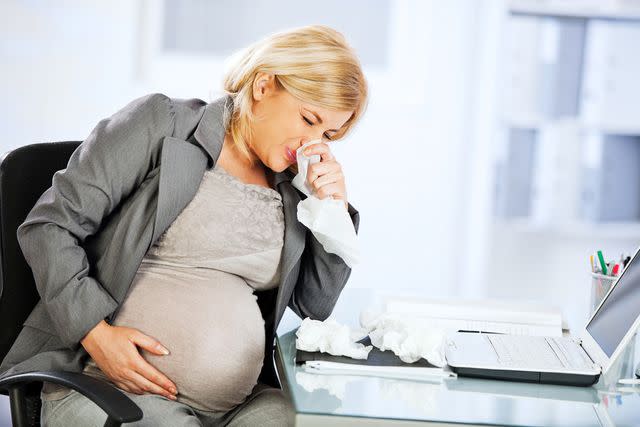Can I Take Antihistamines During Pregnancy?
Medically reviewed by Daniel More, MD
If you're pregnant, you may wonder if it's safe to use antihistamines. An estimated 10% to 15% of pregnant people do use these drugs to treat allergic rhinitis (runny nose) as well as hives, nausea and vomiting, asthma, indigestion, and more.
Studies have shown that most antihistamines do not appear to be linked to birth defects and that certain medications, such as Zyrtec (cetirizine) and Claritin (loratadine), may be safe to use during pregnancy. However, researchers often note that more study is needed, and caution is urged especially during the first trimester of pregnancy.
This article discusses antihistamine use and safety during pregnancy, according to research, evidence, and health professionals' recommendations.

Is It Safe to Take Antihistamines During Pregnancy?
A group of researchers from the United States and Singapore sought to determine the safety of antihistamines taken during the first trimester of pregnancy. The researchers examined data collected over a 12-year period, from 1998 to 2010, on over 13,000 babies born with birth defects, and compared them to nearly 7,000 babies without birth defects.
Approximately 14% of all babies had been exposed to various antihistamines the mother took during the first trimester of pregnancy. Some antihistamines, such as Benadryl (diphenhydramine) and Claritin, have increased in use by pregnant people over the years. The use of other antihistamines, such as Chlor-Trimeton (for cold symptoms) and Unisom (a sleep aid), has decreased.
However, in an attempt to assess the risk of developing other common birth defects, the researchers did find an association between the use of Chlor-Trimeton and neural tube defects (which forms the early brain and spine), and various congenital heart malformations.
Takeaway
The 2018 treatment guidelines from the World Allergy Organization and European experts note that no birth defects have been reported in people taking second-generation antihistamines. However, they add caution given the limited research data on Claritin and small-sample studies of Zyrtec.
Which Antihistamines Are Safe to Use in Pregnancy?
In a 2014 study conducted by the Centers for Disease Control and Prevention (CDC), researchers reviewed 54 published scientific articles that examined the link between antihistamine use during pregnancy and birth defects.
They found that the use of most types of antihistamines during pregnancy is not linked to birth defects. However, the researchers noted that certain antihistamine medications need to be further studied to determine their safety in pregnancy.
Although research suggests that many antihistamines are generally considered “safe” during pregnancy, some studies find first-generation drugs (like Benadryl and Unisom) should not be used by pregnant people. They should further be avoided when nursing because their sedative effects are passed through in breast milk.
Oral decongestants also should be avoided during the first trimester. It's recommended that you consult with your healthcare provider before taking any over-the-counter medications, to ensure that you understand the effects and any risks.
That's also true for allergy shots, which are generally considered safe during pregnancy but should be evaluated in each case.
Takeaway
According to the American College of Obstetricians and Gynecologists (ACOG), studies show that the following over-the-counter antihistamine medications may be safe to use while pregnant:
Chlorphenamine
Dexchlorpheniramine
Hydroxyzine
Claritin and Zyrtec may be safe to use, but ACOG warns that Sudafed and other pseudoephedrine drugs (decongestants often found in allergy medication) should be avoided during the first trimester. There's some evidence they contribute to birth defects affecting the abdominal wall.
Related: Common Allergy Treatments
Possible Associations Between Antihistamines and Birth Defects
Previously reported associations (possible links but not necessarily the cause) between antihistamines taken during the first trimester of pregnancy and certain birth defects include:
Diphenhydramine (Benadryl): Cleft lip and cleft palate, neural tube defects, spina bifida, limb reduction defects, gastroschisis
Loratadine (Claritin): Hypospadias (a male urethra defect)
Chlorpheniramine (Chlor-Trimeton): Eye defects, ear defects, heart defects, spina bifida, cleft lip, and cleft palate
Doxylamine (Unisom): Heart defects, anal-rectal malformation, digestive tract problems, spina bifida and neural tube defects, cleft lip, and cleft palate
A 2022 update based on the National Birth Defects Prevention Study (NBDPS) looked at exposure for 14 different antihistamines and 64 birth defect categories. It found some consistent patterns, with possible links between:
Neural tube defects and exposure to any antihistamine
Spina bifida and exposure to any antihistamine
Craniosynostosis (bone fusion problems affecting the head) and exposure to diphenhydramine
Hypoplastic left heart syndrome and doxylamine
The evidence wasn't especially strong, though, and the study authors call for more research.
Takeaway
Promethazine is the most commonly used antihistamine in pregnant people. Most antihistamines are available OTC without a prescription but you should seek the advice of a healthcare provider before taking this or other drugs.
Any medication taken during pregnancy is best taken for the shortest amount of time, and at the lowest dose that is effective for treating symptoms. The benefit of taking any medication needs to be weighed against the risk of not taking the medication.
Alternatives to Antihistamines During Pregnancy
During pregnancy, antihistamines aren't the only treatment option for symptom relief. You can also try natural antihistamines such as:
Be sure to discuss use of these options with your healthcare provider, too.
Summary
Antihistamine drug use is common, with medications like Claritin and Benadryl used to relieve allergy and cold symptoms, improve sleep, reduce nausea and vomiting, and more. Yet pregnant people may need to be more cautious about antihistamine use.
Study results on antihistamines and birth defects remain inconclusive, but there's general consensus that their use should be avoided during the first trimester of pregnancy. Decongestants should be avoided, too, and second-generation antihistamines may pose less risk.
Talk to your healthcare provider to discuss your options before taking an antihistamine while pregnant.
Read the original article on Verywell Health.

